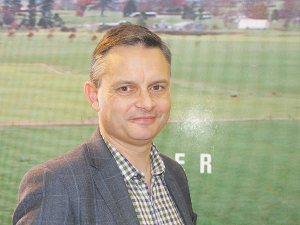DairyNZ chair wants cross-party deal
New DairyNZ chair Tracy Brown says bipartisan agreement among political parties on emissions pricing and freshwater regulations would greatly help farmers.
 Climate Change Minister James Shaw says the agriculture emissions pricing proposals made by the Government are what the industry proposed.
Climate Change Minister James Shaw says the agriculture emissions pricing proposals made by the Government are what the industry proposed.
OPINION: Farmer pushback against the Government's proposal to tax farm emissions is in full flight.
Especially from the beef and sheep sector - including many iwi with substantial beef and sheep interests - and the architects of their misery, He Waka Eke Noa, find themselves backed into a corner of their own making.
As Climate Change Minister James Shaw says, somewhat disingenuously, this is what the industry proposed. To be fair, the Government's version of the proposal differs on some key aspects, but in the main is what levy-funded industry leaders proposed on behalf of farmers, and is what those same farmers are now faced with.
As farmer ginger group, loosely named ‘Waka Adrift’, notes, when the PM made the announcement that the proposal put forward by industry was, by and large, being accepted: “In a refreshingly transparent way, the PM also highlighted the financial and social impacts on sheep, beef and deer farmers – their own modelling revealing a likely 20% plus exodus forced from the sector. Given that the modelling released by B+LNZ after consultation showed a similar level of potential impact, we are now finding it hard to understand why the levy bodies are responding so negatively to the government proposal.”
Some will baulk at the accusation that HWEN partners made a “conscious decision to sacrifice sheep and beef farmers and their communities to create the offset for more intensive farming to continue and this has now been exposed”. And some will not: After a fiery meeting in Gore on Oct 28, Southland farmer Hugh Gardyne has written to B+LNZ chief executive Sam McIvor, on behalf of farmers at the meeting, to express their anger and frustration about how it has represented the sheep and beef sector via the HWEN process.
‘Waka Adrift’ started ringing alarm bells weeks ago, to draw attention to the serious risks that the HWEN proposal posed to the future of the extensive sheep, beef, deer and regenerative farms and rural communities. They warned that the ‘consultation’ with farmers was too rigid and narrow, and that farmers did not know exactly what they were being signed up for.
Now they know, and they’re not happy. The question is, is it too late for industry leaders to harness their “disappointment” with the outcome to force some major changes to the Government’s proposal?
Donald Trump's latest tariff tantrum has again thrown the world of trade into a new round of turmoil and uncertainty, and NZ is caught up in it.
The third edition of the NZ Dairy Expo, held in mid-February in Matamata, has shown that the KISS principle (keep it simple stupid) was getting a positive response from exhibitors and visitors alike.
Twenty years ago, South African dairy farm manager Louis Vandenberg was sent to a farm in Waikato to provide training on Afimilk technology.
Strong farmgate milk price is helping boost investment on farms, says PGG Wrightson chief executive Stephen Guerin.
Fonterra's 460 milk suppliers in Australia, who will switch to Lactalis end of this month, are unfazed with the impending change.
The 5+ A Day Charitable Trust has launched a collection of affordable recipes designed to turn everyday vegetables into seasonal stars.

OPINION: A mate of yours truly reckons rural Manawatu families are the latest to suffer under what he calls the…
OPINION: If old Winston Peters thinks building trade relations with new nations, such as India, isn't a necessary investment in…